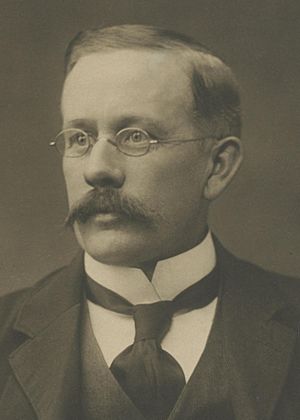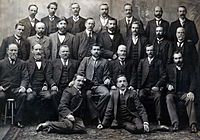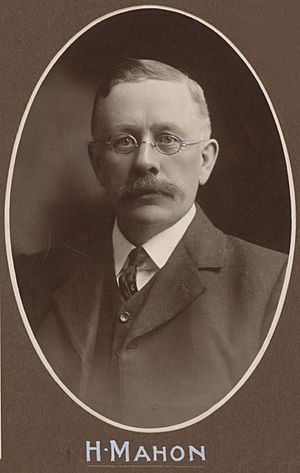Hugh Mahon facts for kids
Quick facts for kids
Hugh Mahon
|
|
|---|---|
 |
|
| Minister for External Affairs | |
| In office 9 December 1914 – 14 November 1916 |
|
| Prime Minister | Andrew Fisher Billy Hughes |
| Preceded by | John Arthur |
| Succeeded by | Portfolio abolished |
| Minister for Home Affairs | |
| In office 13 November 1908 – 2 June 1909 |
|
| Prime Minister | Andrew Fisher |
| Preceded by | John Keating |
| Succeeded by | George Fuller |
| Postmaster-General of Australia | |
| In office 27 April 1904 – 17 August 1904 |
|
| Prime Minister | Chris Watson |
| Preceded by | Philip Fysh |
| Succeeded by | Sydney Smith |
| Member of the Australian Parliament for Kalgoorlie |
|
| In office 13 December 1919 – 12 November 1920 |
|
| Preceded by | Edward Heitmann |
| Succeeded by | George Foley |
| In office 22 December 1913 – 5 May 1917 |
|
| Preceded by | Charlie Frazer |
| Succeeded by | Edward Heitmann |
| Member of the Australian Parliament for Coolgardie |
|
| In office 29 March 1901 – 31 May 1913 |
|
| Preceded by | New seat |
| Succeeded by | Division abolished |
| Personal details | |
| Born | 6 January 1857 Killurin, County Offaly, then King's County, Ireland |
| Died | 28 August 1931 (aged 74) Ringwood, Victoria, Australia |
| Political party | Labor |
| Spouse | Mary Alice L'Estrange |
| Occupation | Newspaper owner, politician, business man |
Hugh Mahon (born 6 January 1857 – died 28 August 1931) was an important Australian politician. He was a member of the Australian Labor Party (ALP). He held several important jobs in the government when the Labor Party was first formed. He served as the Postmaster-General (1904), Minister for Home Affairs (1908–1909), and Minister for External Affairs (1914–1916).
Hugh Mahon is best known for being the only person ever expelled from the Parliament of Australia. This happened because he made strong statements about the British Empire. He was accused of saying things that were "seditious and disloyal." After being expelled, he tried to win his seat back but was unsuccessful.
Contents
Early Life and Career
Hugh Mahon was born in Killurin, a small town in Ireland, in 1857. When he was 12, his family moved to Canada and then the United States. There, he learned how to work in printing. Around 1880, he went back to Ireland. He became the editor of a newspaper called the New Ross Standard.
Mahon was very involved in the Irish National Land League. This group fought for the rights of Irish farmers. He was even jailed in 1881 alongside other leaders, like Charles Stewart Parnell. He was released early because he was sick.
To avoid being arrested again, Mahon moved to Australia in 1882. He helped organize a tour for Irish nationalist leaders in Australia. He then worked for newspapers in Goulburn and Sydney. Later, he bought his own newspaper in Gosford. In 1888, he married Mary Alice L'Estrange. After trying to get elected to the NSW parliament without success, he sold his newspaper. He moved to Melbourne and worked for the Australian Mining Standard. In 1895, he moved to the goldfields of Western Australia. There, he started another newspaper called The Menzies Miner.
Political Journey
Starting in Politics
Mahon became well-known as a strong newspaper editor. This helped him win the new federal seat of Coolgardie in the 1901 election. He joined the Labour Party (now called the Labor Party).
Federal Government Roles
Once in federal parliament, Mahon gained a reputation for his sharp wit. He believed in a fair approach to how Aboriginal people were treated. He asked for a special investigation into their treatment in Western Australia. He also wanted to change the Constitution. This change would give the federal parliament power to make laws about Aboriginal people. This change finally happened with a referendum in 1967. However, Mahon did not see Aboriginal people as equals. He believed they needed "sympathetic but undeviating treatment." He also strongly supported the White Australia Policy.
In 1905, Mahon helped pass resolutions in parliament. These resolutions supported "Irish home rule," which meant Ireland governing itself. He became a strong supporter of Irish nationalism. He gave speeches on St Patrick's Day. In 1910, he asked King George V to remove phrases offensive to Catholics from his Coronation Oath.
Mahon served as Postmaster-General in 1904. This job involved managing postal and telegraph services. He was also Minister for Home Affairs from 1908 to 1909. In this role, he helped choose the location for Australia's capital city, Canberra.
In 1913, his seat of Coolgardie was removed. He then won the seat of Kalgoorlie without opposition. After the 1914 elections, he became an assistant minister. In December 1914, he became Minister for External Affairs. This role involved dealing with other countries.
Mahon held this position until 1916. The Labor Party split happened over the issue of conscription. Conscription meant forcing people to join the army. Mahon resigned from Prime Minister Billy Hughes's government. He wasn't completely against conscription. But he felt it wasn't needed at that time. He lost his seat in the 1917 election but won it back in 1919.
Expelled from Parliament
The Irish War of Independence started in 1919. Mahon began to support Irish independence. In October 1920, an Irish nationalist named Terence MacSwiney died after a hunger strike. On 7 November, Mahon spoke at a public meeting in Melbourne. He strongly criticized British rule in Ireland. He said that MacSwiney's widow's sadness would one day "shake the foundations of this bloody and accursed Empire."
On 11 November, Prime Minister Billy Hughes moved to expel Mahon from parliament. The next morning, the House of Representatives voted. They decided Mahon had made "seditious and disloyal utterances." They said his conduct was "unfitting him to remain a member." This meant he was no longer fit to be a member of parliament.
Hugh Mahon is mostly remembered for this unique event. He is the only person ever expelled from the Australian Parliament. He tried to win his seat back in the December 1920 by-election but lost.
Later, in 1984, a parliamentary committee said Mahon's expulsion was an "abuse of power." In 1987, a new law was passed. This law removed the parliament's power to expel its members. There have been recent efforts to formally recognize that the expulsion was unfair.
Later Life and Passing
After leaving parliament, Mahon continued his work. He was the managing director of the Catholic Church Property Insurance Co. He had started this company in 1912. In 1921, he traveled to Europe. He planned to attend the Irish Race Convention in Paris. However, he became ill and missed the meeting.
After recovering, he visited Rome and met with Pope Pius XI. He then visited Ireland, his home country, for the first time in 40 years. He had a family reunion there. He also gave an interview supporting the Anglo-Irish Treaty. He criticized the Irish Labour Party in this interview. When he returned to Australia in 1922, he hoped to become Ireland's Consul General. But the Irish Civil War stopped this from happening.
In August 1931, Mahon became ill in Sydney. He returned to Melbourne and died from a lung disease. He was buried in Box Hill Cemetery. He was survived by his wife and four children. During the parliament's condolence motion for him, one member, Roland Green, walked out. Green was a war veteran who had lost a leg. He said he could not support the motion because of Mahon's past words against the Empire. However, others, like Archbishop Daniel Mannix, praised Mahon. Mannix called him "a good Irishman, a good Australian and an exemplary Catholic."
 | Bessie Coleman |
 | Spann Watson |
 | Jill E. Brown |
 | Sherman W. White |



